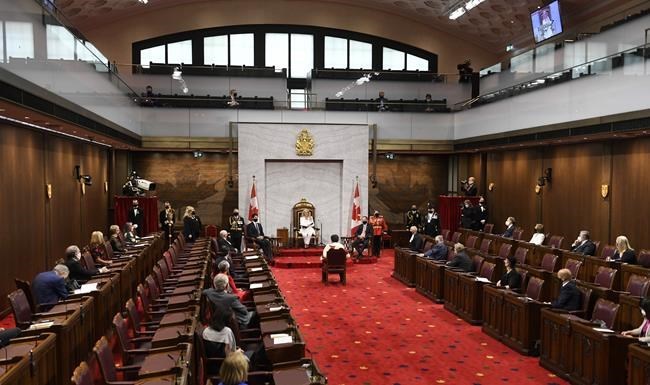OTTAWA — Some Senate staffers are concerned that a new policy meant to protect them from workplace harassment is being blocked in the upper house by a handful of senators.
But Sen. Marilou McPhedran, who is leading the charge against the new policy, has no intention of backing down.
She contends the new policy would silence victims and is even worse than the existing one, which did little to protect staffers from sexual misconduct, harassment and bullying, resulting in scandals that have tarred the institution's reputation in recent years.
McPhedran was among a number of senators who said no last week when Sen. Raymonde Saint-Germain, chair of the human resources subcommittee that drafted the new policy, sought to have the existing policy repealed immediately so that the new one could be adopted.
Amanda McLaren and James Campbell, who represent staffers on the Senate's workplace health and safety committee, say they're worried that the policy may end up languishing on the order paper and eventually die if there's an election.
"Our biggest concern is the roadblocks that it's facing in the Senate right now," McLaren said in an interview.
"The fact that it's buried so far down on the order paper because of some procedural stuff that went down (last week), there's a real danger that it won't be adopted and we'll be back at square one."
Campbell said he and McLaren decided to speak out because they felt "it was crucial to have our voices heard on this as something that is … critical in ensuring our collective safety and well-being as employees of the Senate."
"We find ourselves here after literally years of work, development and scrutiny on this issue with the very possible reality that we might have nothing to show for it," he said.
For her part, McPhedran said she's "truly, truly sorry that staffers feel that this delay is harming them."
"I would not be doing what I'm doing if I didn't deeply believe, based on 40 years of working in this field as a lawyer, that this is the wrong way for the Senate of Canada to go and it will not help staffers in the long term."
The new policy has been in the works for three years, following the scandal involving former senator Don Meredith.
He was found after a lengthy investigation by the Senate's ethics officer to have engaged in a pattern of inappropriate behaviour, including sexual harassment, bullying and intimidation of staffers, nine of whom the Senate subsequently agreed to compensate.
Meredith resigned from the Senate in 2017 before senators could vote to expel him, after an earlier investigation by the ethics officer found he'd engaged in a sexual relationship with a teenager.
Responding to criticism that the Senate's internal handling of harassment complaints is slow, self-serving and geared more toward shielding senators than protecting victims, the new policy would give complainants the option of an independent, third-party investigation, to be concluded within six months.
It would also empower the Senate to mete out disciplinary measures, including outright expulsion from the chamber.
McPhedran's concern revolves around the requirement that all participants in a third-party investigation would be bound to confidentiality, with vague threats of "disciplinary action" for anyone who violates it.
The enforced secrecy is akin to non-disclosure agreements, which have been used to gag victims and protect their abusers and which have been banned in other jurisdictions, she said. Complainants would be forbidden from going to the media, which is often what encourages other victims, including in the Meredith case, to come forward.
"It boils down to this: you step into this process and you are locked down with confidentiality requirements … You have to have a more open process if you're actually going to create a prevention culture," she said.
McPhedran also takes issue with what she calls the secretive process set up by the Senate's internal economy committee to draft the policy, from which she said she was totally shut out.
However, Saint-Germain said her subcommittee consulted intensively with staff in the Senate's administration and senators' offices, as well as "many, many" outside experts in the field of mediations, conciliation and workplace issues.
She acknowledged McPhedran has expertise in the field but said: "The majority of the experts with great credentials that we have consulted think otherwise" about the policy.
"It's the beginning of a new era in the Senate of Canada, with a sound and very robust prevention of harassment, any form of harassment by anyone, and at the same time tacking the issues if and when they will occur."
The confidentiality requirement, Saint-Germain said, is aimed primarily at assuring complainants that their privacy will be protected. And she said it applies only during the investigation; victims are free to speak publicly before and after that process.
It's also a matter of "natural justice," she said, since "as long as the (investigation) process is ongoing, we are working with allegations."
McLaren and Campbell said they believe the policy is being jeopardized by bickering over "small things."
But McPhedran said other staffers have come to her with concerns.
One of her own staffers, Clare Shrybman, said she felt compelled to speak to The Canadian Press after she heard that other staffers had spoken in support of the policy.
"I think it mandates silence on the part of the individuals who've experienced harassment and that serves the perpetrator," said Shrybman, who is working on her master's degree in human rights law.
This report by The Canadian Press was first published March 22, 2021.
Joan Bryden, The Canadian Press



